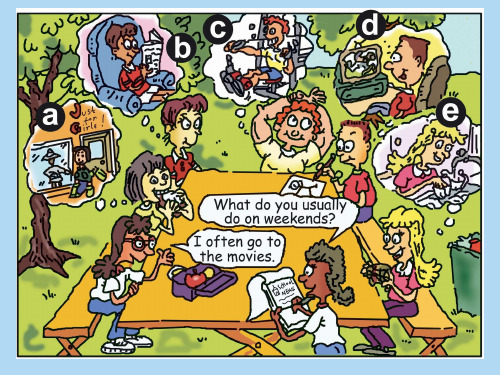人教版八年级英语上册UAGFc教学课件
合集下载
人教版八年级上册英语全册课件-八上英语课件

do anything
✔
Julie interesting?
study for tests? ✔
go out with anyone?
✔
Talk about your vacation plans with your friends and fill in the chart.
Name Vacation plans Who? When?
Where did you go on vacation?I went to
the
2mountai 1 ns.
4
53
1. Tina 2. Xiang Hua
3. Sally
4. Bob
5. Tom
1c
A: What did Tina go on vacation? B: She went to the mountains.
stayed at home
Where did you go on vacation?
went to New York City
Where did you go on vacation?
went to the beach
Where did you go on vacation?
visited my uncle
People
Places
Grace New York City (Central Park) Kevin the beach Julie stayed at home
2b Listen again. Check (✔) Yes, I did or No, I didn’t for each question.
anyone 任何人 each 每个
人教版八年级英语上册-全册PPT课件全集(149张)

26) more than 多于
课文要点
1、What do you usually do on weekends?
on weekens 表示“在周末”,泛指每个周末; on the weekend表示“在周末,在这个周 末”,特指某个周末。
2、help with housework
help sb. with sth. = help sb. (to) do sth
初二英语上册
Unit 1: Where did you go on vacation?
New Words.
anyone wonderful something seem someone try different umbrella hungry dislike anywhere most everyone bored dicide wonder wait enough
修饰不可数名词,意为 “太多”,还可修饰动词 做状语
修饰形容词或副词,意为 “太”
She bought too many eggs. We have too much work to do.
You are walking much too fast.
too much, much too,用法区别看后头,much后接不可数, too后修饰形或副。Too many 要记住,后面名词必复数。
1)单数名词词尾加’s, 复数名词词尾没有s, 也要加 ’s the girl’s pen Children’s Day
2)复数名词以s结尾的只加 ’ the students’ reading room
3)如果两个名词并列,并且分别有 ’s, 则表示“分别有”; 只 有一个名词有一个’s, 则表示“共有”;
【精品】人教版八年级上册英语全册教学课件【1】

➢ Warming-up Let's enjoy a chant.
On vacation
We went on a vacation, vacation, vacation. We went on a vacation. And what do you think we saw? And what do you think we saw? And what do you think we saw? Other people on vacation. People on vacation. People on vacation. That’s the only thing we saw.
go sightseeing visit museums
go fishing
Vacation Activities
go to the mountains
stay at home
go to the beach go to summer camp
go hiking
短语搭配
go on vacation go to summer camp go to New York City
状元成才路
take photos visit my uncle
拜访我的叔叔 照相 去参加夏令营 去纽约 去度假
Where did she go on vacation?
She visited the USA. She went to New York City.
Where did they go on vacation?
露营地, 阵营
Where did you go on vacation? I went to Beijing City.
人教版八年级英语上册全套PPT课件

on vacation?
I went to the
mountains.
1
1. stayed at home __f___ 2. went to New York City ___b___ 3. visited my uncle __g__ 4. went to summer camp __d___ 5. went to the mountains __c___ 6. went to the beach __a____ 7. visited museums ___e___
Did you …
go with anyone? Grace go to Central Park? buy anything special?
Yes, I did.
✔
✔
✔
No, I didn’t.
play volleyball?
✔
Kevin swim?
✔
meet anyone
✔
interesting?
A: Grace, where did you go on vacation?
B: I went to New York City. A: Oh, really? Did you go with
anyone? B: Yes, I went with my mother.
Did you see Huangguoshu Waterfall? 黄果树瀑布
nothing 无物 all 全体;全部 both 两个(都) none 没人或物 (指两个以上)
other(s) 另一个 (些) another 另外一 个;又一个 much 很多
many 很多
neither 没人或物
2021年秋人教版八年级上册英语全册教学课件

He visited his grandparents.
1a Match the activities with the pictures [a-g].
1. stayed at home __f___ 2. went to New York City _b__ 3. visited my uncle _g__
➢ Warming-up
We went on a vacation, vacation, vacation.
We went on a vacation. And what do you think we saw?
On vacation
And what do you think we saw?
And what do you think we saw?
go to the mountains stay at home
go to the beach
go to summer camp
go hiking
Where did you go on vacation? Who did you go with? Did you have a good time?
Where did Bob go on vacation?
He visited his uncle.
Where did Tom go on vacation? He went to summer camp.
Where did Sally go on vacation? She stayed at home.
Other people on vacation.
People on vacation.
People on vacation.
That’s the only thing we saw.
1a Match the activities with the pictures [a-g].
1. stayed at home __f___ 2. went to New York City _b__ 3. visited my uncle _g__
➢ Warming-up
We went on a vacation, vacation, vacation.
We went on a vacation. And what do you think we saw?
On vacation
And what do you think we saw?
And what do you think we saw?
go to the mountains stay at home
go to the beach
go to summer camp
go hiking
Where did you go on vacation? Who did you go with? Did you have a good time?
Where did Bob go on vacation?
He visited his uncle.
Where did Tom go on vacation? He went to summer camp.
Where did Sally go on vacation? She stayed at home.
Other people on vacation.
People on vacation.
People on vacation.
That’s the only thing we saw.
人教版八年级上Unit1PPT课件

06
口语表达与交际能力培养
口语表达技巧指导
语音语调
指导学生正确发音,练习升降调,使口语表达更自然流畅。
词汇运用
教授学生运用恰当的词汇描述事物、表达情感,提高表达 的准确性和生动性。
句式变化
引导学生使用不同的句式结构,如简单句、并列句、复合 句等,增强表达的多样性和逻辑性。
情景对话设计与角色扮演
小组讨论
组织学生进行小组讨论,围绕特定话题展开讨论,提高学生的参与度和
口语表达能力。
02
演讲比赛
定期举办演讲比赛,鼓励学生积极参与,锻炼学生的演讲技巧和公众表
达能力。
03
语言游戏
设计有趣的语言游戏,如绕口令、猜谜语等,让学生在游戏中提高口语
表达的流利度和准确性。
THANKS。
设计真实场景
模拟生活中的各种场景,如学校、家庭、商店等,让学生在真实环境中进行口语练习。
角色扮演
分配学生扮演不同角色,如教师、学生、家长、店员等,通过角色扮演练习口语表达和交际 能力。
对话示范与引导
提供对话示范,引导学生掌握对话的基本结构和表达方式,鼓励学生自由发挥,创新表达。
口语练习活动组织
01
5. Could you please tell me how _______ (get) to the post office?
语法练习题及答案解析
答案解析
1. goes。主语he是第三人称单数,所以谓语动词要用第三人称单数形式 goes。
2. play。情态动词can后面跟动词原形play。
语法练习题及答案解析
• 例句:It's important to arrive on time. 准时到达 很重要。
人教版八年级英语上册ppt课件

经营者提供商品或者服务有欺诈行为 的,应 当按照 消费者 的要求 增加赔 偿其受 到的损 失,增 加赔偿 的金额 为消费 者购买 商品的 价款或 接受服 务的费 用
经营者提供商品或者服务有欺诈行为 的,应 当按照 消费者 的要求 增加赔 偿其受 到的损 失,增 加赔偿 的金额 为消费 者购买 商品的 价款或 接受服 务的费 用
3b Use the words given to write questions. Then ask
and answer them with a partner.
经营者提供商品或者服务有欺诈行为 的,应 当按照 消费者 的要求 增加赔 偿其受 到的损 失,增 加赔偿 的金额 为消费 者购买 商品的 价款或 接受服 务的费 用
chart and then make conversations.
经营者提供商品或者服务有欺诈行为 的,应 当按照 消费者 的要求 增加赔 偿其受 到的损 失,增 加赔偿 的金额 为消费 者购买 商品的 价款或 接受服 务的费 用
2d Role-play the conversation.
Jack: Hi, Claire, are you free next week? Claire: Hmm ... next week is quite full for me, Jack. Jack: Really? How come? Claire: I have dance and piano lessons. Jack: What kind of dance are you learning? Claire: Oh, swing dance. It’s fun! I have class once a week,
l.
Wow!
新人教八年级上册Unit全单元PPT课件

e.g. I have fewer friends.我有更少的朋友。
第14页/共55页
fewer,less和more (1)fewer同上。
e.g. My friend has fewer apples than I. 我朋友比我的苹果少。
(2)less较少的;更少的,little的比较级,修饰不可数名词。 e.g. I have less money in my bag. 我包里的钱更少了。
活到200 岁 居住在地球上 生活在空间站 和某人生活在一起 更少使用地铁 非常大而拥挤 关于未来的预测 一本关于未来的书 在未来 更拥挤,更污染
第1页/共55页
be in (great) daplanets play a part in saving the
第11页/共55页
【例题】 The teacher marked(批分数) the exam ______ and wrote the students' grades on a piece of ______.
A.papers;paper
B.paper;papers
C.paper;paper
D.papers;papers
其否定形式是在will 后加not; 疑问句形式是把will 提到there前。 简略肯定回答: Yes ,t here will. 简略否定回答:No,there won't. e.g. There will not be enough room for people to live in.
将没有足够的给人住的空间。 e.g. Will there be fewer animals in the world? 世界上将有更少的动物吗? fewer adj. (few的比较级) 较少的;更少的,修饰可数名词的复数形式。
第14页/共55页
fewer,less和more (1)fewer同上。
e.g. My friend has fewer apples than I. 我朋友比我的苹果少。
(2)less较少的;更少的,little的比较级,修饰不可数名词。 e.g. I have less money in my bag. 我包里的钱更少了。
活到200 岁 居住在地球上 生活在空间站 和某人生活在一起 更少使用地铁 非常大而拥挤 关于未来的预测 一本关于未来的书 在未来 更拥挤,更污染
第1页/共55页
be in (great) daplanets play a part in saving the
第11页/共55页
【例题】 The teacher marked(批分数) the exam ______ and wrote the students' grades on a piece of ______.
A.papers;paper
B.paper;papers
C.paper;paper
D.papers;papers
其否定形式是在will 后加not; 疑问句形式是把will 提到there前。 简略肯定回答: Yes ,t here will. 简略否定回答:No,there won't. e.g. There will not be enough room for people to live in.
将没有足够的给人住的空间。 e.g. Will there be fewer animals in the world? 世界上将有更少的动物吗? fewer adj. (few的比较级) 较少的;更少的,修饰可数名词的复数形式。
- 1、下载文档前请自行甄别文档内容的完整性,平台不提供额外的编辑、内容补充、找答案等附加服务。
- 2、"仅部分预览"的文档,不可在线预览部分如存在完整性等问题,可反馈申请退款(可完整预览的文档不适用该条件!)。
- 3、如文档侵犯您的权益,请联系客服反馈,我们会尽快为您处理(人工客服工作时间:9:00-18:30)。
件事物;一切
注意:
1. some 和any 既可修饰可数名词复数,也 可修饰不可数名词。some 多用于肯定句, any则多用于否定句、疑问句和条件从句。 例如:
A: Are there any apples in the fridge? B: Yes, there are some.
/ No, there aren’t any. A: Is there any water in the bottle? B: Yes, there is some water.
动词过去式 的构成
规则动词 regular verbs
不规则动词 irregular verbs
1. 动词be的变化:
am
is
was are were
2. 助动词do的变化: do→ did (在过去时里助动词do没有人称 和数的变化) 如:Did you play soccer yesterday?
somebody 某人 all 全体;全部
someone 某人 both 两个(都)
something 某事; none 没人或物
某物
(指两个以上)
other(s) 另一个 (些)
another 另外一 个;又一个
much 很多 many 很多
neither 没人或物
(指两个当中)
anybody 任何 either 任何一个
3b Fill in the blanks in the e-mail message with the words in the box.
anything everything nothing everyone no one
Dear Bill, How was your vacation? Did you do _a_n_y_th_i_n_g_ interesting? Did _ev_e_r_y_o_n_e_ in the family go with you? I went to a friend’s farm in the countryside with my family.
2. Would you like _s_o_m__e_ milk? 3. Will you give me __so_m__e_ paper?
2. 由some, any, no, every 构成的复合不定代词 作主语时,都作单数看待,其谓语动词用第 三人称单数形式。例如:
Something is wrong with my watch. Well, everyone wants to win. Nobody knows what the future will be like. There is something for everyone at Greenwood Park.
(3) 以重读闭音节结尾并且词尾只有一个辅 音字母,要先双写这个辅音字母,再加-ed。
e.g. stop—stopped drop—dropped plan—planned
巧识闭音节: 音节中的元音为 / eɪ /,/ iː /,/ aɪ /,/ əʊ /,/ u: / 之外 的音。例:seem / siːm / 开音节 pig / pɪg / 闭音节
Suary:something,nothing, everyone,someone,myself,yourself, go out,of course 2.Target language: ①A:Where did you go on vacation? B:I went to New York City. ②A:Did you buy anything special? B:Yes,I bought something for my father. 3.Structure:something special
Past 过去
Now 现在
went to the movies did my homework played tennis played soccer cleaned the room
go to the movies do my homework play tennis play soccer clean the room
1.背诵单词myself-diary 2.背诵grammar focus 3.复习语法知识
_E_v_e_r_y_t_h_in_g__ was great. We fed some hens and saw some baby pigs. They were so cute! The only problem was that there was _n_o_t_h_in_g_ much to do in the evening but read. Still _n_o__o_n_e_ seemed to be bored. Bye for now! Mark
Grammar focus
Unit 1
Where did you go on vacation?
Section A (Grammar Focus-3c)
Indefinite Pronouns
不定代词:不指名代替任何特定名词或形容词 的代词叫作不定代词。常见不定代词如下所示:
some 一些
nothing 无物
(4) 以辅音字母加y结尾的单词,先改y为i, 再加-ed。 e.g. study—studied carry—carried
(5) 不规则变化需要按一定的规律逐个记忆。
句子构成:
系动词be的过去时.
am (is) →was
are →were
陈述句:He was at home yesterday.
人
(指两个当中)
anyone 任何人 each 每个
few 很少
a few 一些; 几个
anything 任何 事物
no 无 nobody 无人
every 每个 everybody 每人; 大家;人人
everyone 每人
little 很少
a little 一些
one 一个(人 或物)
no one 无人 everything 每一
3a Fill in the blanks with the words in the box and practice the conversation.
Linda: Did you do _a_n_y_th__in_g_ fun on
your vacation, Alice?
/ No, there isn’t any water.
但是,在Would you like some tea? 这类 问句中则用some, 而不用any, 这是因为问 话者希望得到对方肯定的答复。
Fill in the blanks with some or any.
1.There are _s_o_m__e_ tables in the room, but there aren’t _a_n_y____ chairs.
my parents, but n__o_th_i_n_g_ for myself. Linda: Why didn’t you buy a_n_y_t_h_i_n_g_ for
yourself? Alice: I didn’t really see _a_n_y_t_h_in_g_ I liked.
否定句:He wasn’t at home yesterday.
疑问句:Was he at home yesterday?
Yes, he was./ No, he wasn’t.
行为动词的一般过去时:
陈述句:主语+动词过去式+其它 I go to the movie. →I went to the movie. 否定句:主语+助动词didn’t+动词原形+其它 I don’t go to school today. →I didn’t go to school. 一般疑问句:Did +主语+动词原形+其它 Do you have breakfast? →Did you have breakfast? Yes, I do./ No, I don’t. Yes, I did./No, I didn’t.
3. 除no one 以外,其他复合不定代词都写成一 个词。
4. 不定代词若有定语修饰,该定语要置于其后。 例如:
Did anyone see something good at the cinema? For lunch, we had something very special-Malaysian yellow noodles. Do you have anything to say?
一般过去时
构成
动词的过去式
一般过去时 用法
1. 表示过去某个时间发 生的动作或存在的状态。
2. 表示过去经常或 反复发生的动作。
常用时间
(the day before) yesterday last night / week in 1990 / just now On Sunday morning two days ago
anyone
Alice: Yes, I did. I went to Sanya. something
Linda: How did you like it?
anything
Alice: Well, it was my first time everything
there, so _ev_e_r_y_t_h_i_n_g was really nothing
Did he play soccer yesterday?
3. 实义动词的变化: 实义动词分规则变化和不规则变化。 规则变化有以下几种: (1) 一般情况下在动词后加-ed。
